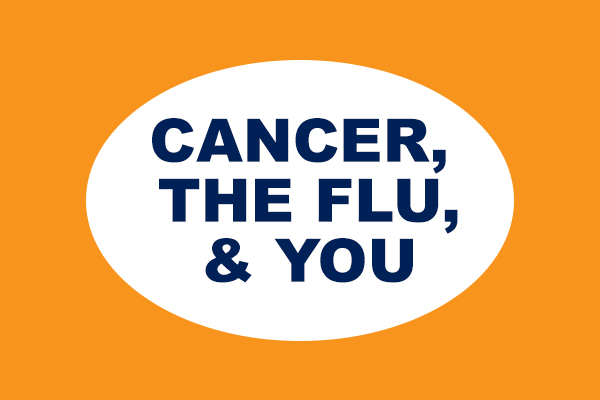Cancer, the Flu, & You
Living with cancer may increase your risk for complications from the flu. If you have cancer now or have had certain types of cancer in the past (such as lymphoma or leukemia), you are at increased risk of developing flu complications that can be serious.
Get Your Flu Shot!
Injectable influenza vaccines (or flu shots) are approved for use in people with cancer and other health conditions. Flu shots have a long, established safety record in people with cancer.
It is also important for people who live with or care for cancer patients to be vaccinated against seasonal flu to reduce the risk of getting the cancer patient sick.
Having the flu increases a person’s risk for pneumococcal disease. Pneumococcal pneumonia is a serious flu-related complication that can cause death. People with cancer or other diseases that compromise the immune system should ask their healthcare providers if pneumococcal shots are needed.
Help stop the spread of germs by
- Avoiding close contact with people who are sick.
- Staying home from work, school, and errands when you are sick.
- Covering your nose and mouth with a tissue when you cough or sneeze.
- Washing your hands or using hand sanitizer often
What to Do If You Get Sick
Make a plan in advance with your doctor about what to do if you get sick. Flu-like symptoms also can be a sign of a very serious infection that is not the flu, including COVID-19. Your plan should explain when you should call your doctor and how to get a prescription for flu antiviral medication quickly if needed.
It’s important for people with cancer to notify their doctor immediately if they get a fever. If you get a fever during your chemotherapy treatment, it’s a medical emergency.
If you have flu symptoms, stay home for at least 24 hours after your fever is gone, except to get medical care or for other necessities. Your fever should be gone without the use of a fever-reducing medicine. Keep away from others as much as possible to avoid making them sick.
COVID-19 and Flu
- Flu vaccines and COVID-19 vaccines can be given at the same time.
- Some of the symptoms of flu and COVID-19 are similar. Testing is needed to tell what the illness is.
- People with a weakened immune system have a higher risk of getting serious flu complications and very sick from COVID-19.
Flu Treatment for Cancer Survivors
The U.S. Centers for Disease Control and Prevention recommends you take flu antiviral drugs to treat flu illness, if your doctor prescribes them. If you get sick, antiviral drugs can make your illness milder and shorten the time you are sick. They may also prevent serious flu complications.
Flu antiviral drugs are prescription medicines (pills, liquid, an inhaled powder, or an intravenous solution) that fight against flu viruses in your body. Antiviral drugs are not sold over the counter. You can only get them if you have a prescription from a health care provider. Antiviral drugs are different from antibiotics, which fight against bacterial infections. Antiviral drugs for flu only work to treat flu. Flu antiviral drugs are different than antiviral drugs used to treat other infectious diseases such as COVID-19. Antiviral drugs prescribed to treat COVID-19 are not approved or authorized to treat flu.
If you have received cancer treatment such as chemotherapy or radiation therapy within the last month or have a blood or lymphatic form of cancer, call your doctor immediately if you have been within six feet of someone known or suspected to have the flu. Ask your doctor if you should be given antiviral drugs to help prevent the flu.
Source: U.S. Centers for Disease Control and Prevention, cdc.gov
This article was updated November 2023.


